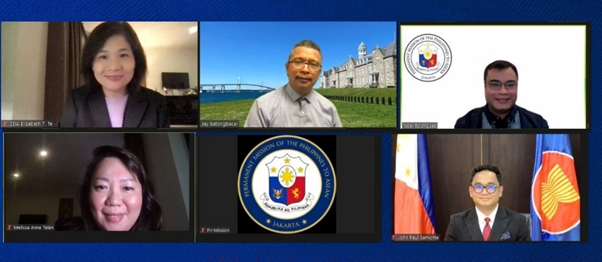JPM-Press Release-2022-27

(Top, left to right: Chargé d’Affaires, a.i. Elizabeth Te of the Philippine Mission to ASEAN; Professor Jay Batongbacal of the University of the Philippines’ College of Law; and Third Secretary Noel Rodriguez (moderator) Bottom, left to right: Third Secretary Melissa Telan and Third Secretary John Paul Samonte (panelists)
29 September 2022, Jakarta – The Permanent Mission of the Philippines to ASEAN conducted a webinar on 29 September 2022 featuring a lecture by Professor Jay Batongbacal of the University of the Philippines’ College of Law entitled “Reaffirming UNCLOS: Rights and Obligations".
The webinar sought to expound on the concept of reaffirming the United Nations Convention on the Law of the Sea (UNCLOS) and what it entails in terms of rights and obligations as ASEAN regularly issues statements and other documents reaffirming the said Convention.
In her opening remarks, Chargé d’Affaires, a.i. Elizabeth T. Te of the Permanent Mission of the Philippines to ASEAN highlighted the importance placed by ASEAN and the Philippines on UNCLOS.
“ASEAN adopts its annual Joint Communiqué where member states reaffirm the need to pursue peaceful resolution of disputes in accordance with international law, including the 1982 UNCLOS,” she said. She further echoed Foreign Affairs Secretary Enrique Manalo’s statement that as an archipelagic state, “the Philippines regards UNCLOS and the Award on the South China Sea Arbitration as our twin anchors of policy and actions on the West Philippine Sea."
Professor Batongbacal, one of the region’s foremost maritime experts, expounded on the relevance of UNCLOS which is hailed as one of the most important global multilateral treaties in modern times.
“UNCLOS creates the framework for the anticipation and prevention of disputes, where the States involved have mutual perceptions of the extent of their territories and jurisdictions, of the analysis and settlement of disputes, in cases where they have differences in positions and claims,” said Professor Batangbacal. “It also provides the most comprehensive set of non-compulsory and compulsory modes of settlement of international disputes."
Professor Batongbacal further stated that such a wide-ranging multilateral agreement would not have been possible without the key contributions of various Southeast Asian States. The Philippines and Indonesia, the two largest archipelagos in the world, were responsible for the introduction and acceptance of the concept of “archipelagic states” in UNCLOS Part IV which resulted in the international recognition of sovereignty of archipelagic states over their vast inter-island waters. On the other hand, Malaysia, Indonesia and Singapore were key players in the negotiations for the Convention’s Part III on Straits Used for International Navigation since these countries host the vital Straits of Malacca and Singapore.
Professor Batongbacal recalled the adoption of the 1992 ASEAN Declaration on the South China Sea, which enshrined the principles of restraint, commitment to peaceful settlement, and promotion of maritime cooperation among Southeast Asian claimants. He noted that these principles were reiterated in the Declaration on the Conduct of Parties in the South China Sea ten years later.
He added that the South China Sea Arbitration award, although binding only on the Philippines and China, is an authoritative interpretation and application of UNCLOS to the South China Sea and has become the subject of diplomatic statements and positions of other ASEAN Member States such as Vietnam, Indonesia, and Malaysia.
“ASEAN cannot but re-affirm its commitment to UNCLOS, and insist upon the proper observance of the rights and obligations as mutually agreed upon by all State Parties to the Convention. UNCLOS is not perfect, and there are still some gaps and problems but the stability of UNCLOS and proper implementation of its contents underlies the stability of the Southeast Asian nations, that are mostly connected through the sea,” Professor Batongbacal concluded. “ASEAN needs UNCLOS, and UNCLOS needs ASEAN, for both to flourish and persist, and bring to reality our shared dreams of a regional international community."
The webinar’s panelists, Third Secretaries John Paul Samonte and Melissa Telan, together with the virtual participants, had the opportunity to pose their questions, requests for clarifications and comments during the open forum that followed the lecture.
The event was in line with Presidential Proclamation No. 316 (2017) declaring September as Maritime and Archipelagic Nation Awareness Month (MANA Mo). The proclamation encourages all agencies and instrumentalities of the Philippines to implement programs and activities that seek to raise awareness and consciousness on maritime and archipelagic issues and concerns.
The Department of Foreign Affairs adopted the sub-theme “Philippines as an Archipelagic State: UNCLOS @ 40” in connection with the 40th Anniversary of the signing of the 1982 United Nations Convention on the Law of the Sea (UNCLOS). (END)

